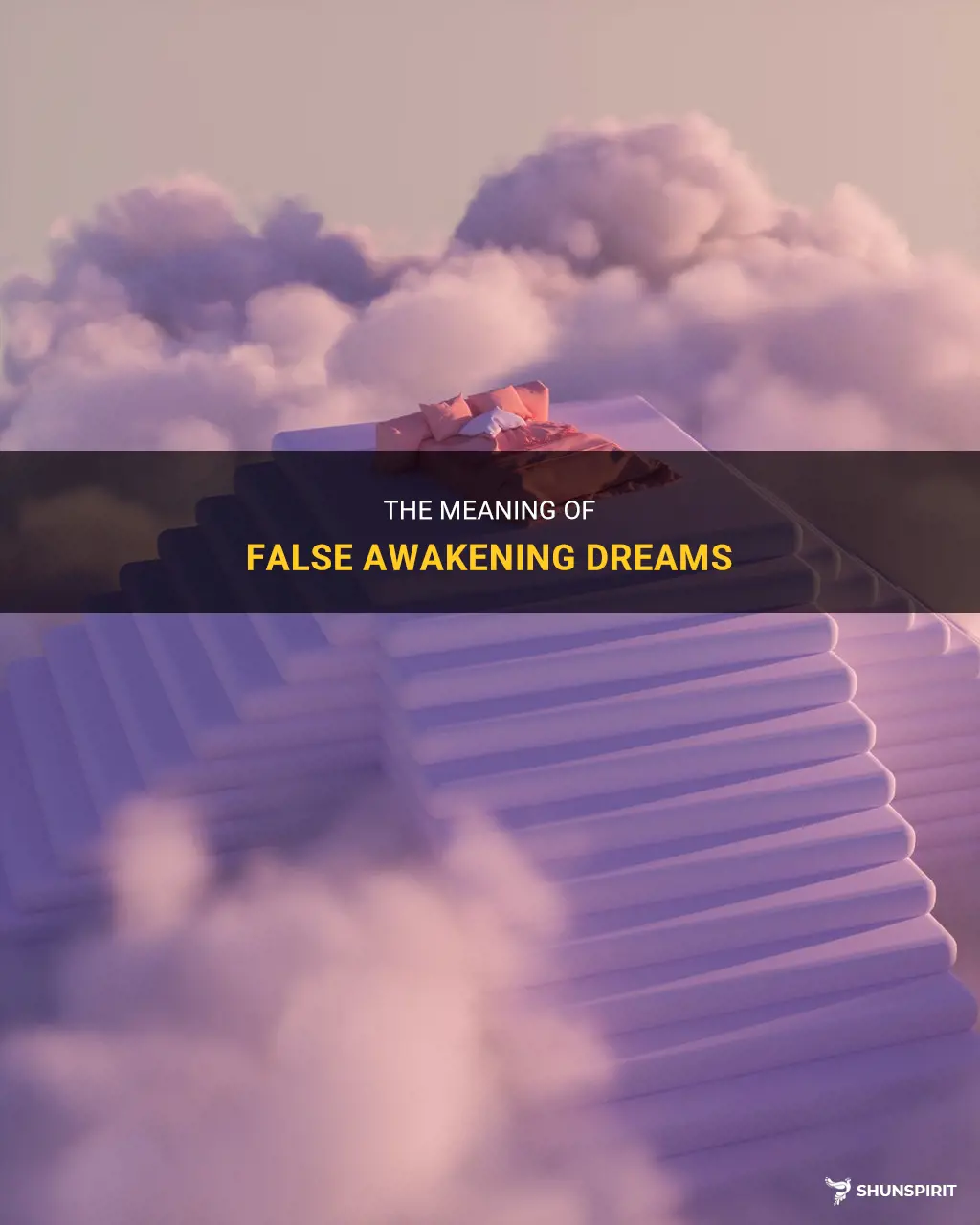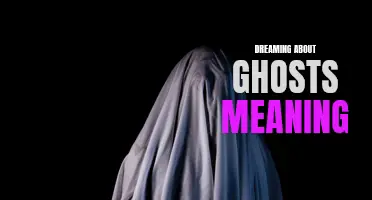
False awakening dreams can be a perplexing and disorienting experience. In these dreams, individuals believe they have woken up from their slumber, only to discover they are still trapped in the world of dreams. While these dreams may seem like harmless mind games played by our subconscious, they can actually hold deeper meanings and insights into our lives. Exploring the significance of false awakening dreams can shed light on our fears, desires, and the ways in which we navigate our waking reality. So buckle up and prepare to dive into the mysterious realm of false awakening dreams, where the line between reality and illusion becomes delightfully blurred.
| Characteristic | Value |
|---|---|
| Frequency | Varies, can occur occasionally or frequently |
| Vividness | Dreams may feel extremely vivid and realistic |
| Sense of Reality | Dreamer may believe they have woken up in their actual surroundings |
| Continuity | Dreams may seamlessly transition from reality to false awakening |
| Confusion | Dreamer may experience confusion and disorientation upon realizing they are still dreaming |
| Repetition | Occurrence of false awakening dreams may repeat throughout a single dream or across multiple nights |
| Themes | Common themes include mundane activities such as getting ready for the day or going to work |
| Emotions | Emotions experienced during false awakening dreams can vary from calm to anxiety and even fear |
| Memory | Dreamer may remember details of the false awakening dream after waking up |
| Lucidity | Some individuals may become aware they are dreaming during a false awakening |
What You'll Learn
- What is a false awakening dream and how is it different from a regular dream?
- What are some common themes or occurrences in false awakening dreams?
- Is there any scientific or psychological meaning behind false awakening dreams?
- Can false awakening dreams be a sign of deeper psychological issues?
- How can someone differentiate between a false awakening dream and reality?

What is a false awakening dream and how is it different from a regular dream?
Dreams are a fascinating and mysterious aspect of human experience. They allow us to explore and process our deepest thoughts and emotions, often in ways that are inaccessible to us in our waking lives. One type of dream that many people have experienced at least once in their lives is a false awakening dream. But what exactly is a false awakening dream, and how is it different from a regular dream?
In a false awakening dream, the dreamer believes that they have woken up from sleep and are going about their daily routine, only to later realize that they are still dreaming. It is a dream within a dream, where the dreamer experiences the mundane activities of everyday life, such as getting out of bed, brushing their teeth, or eating breakfast. These dreams can be so vivid and realistic that it is often difficult to distinguish them from waking reality.
One of the main differences between a false awakening dream and a regular dream is the sense of familiarity and routine that accompanies a false awakening. In a regular dream, the dreamer may experience a variety of strange and fantastical scenarios that are disconnected from their waking life. However, in a false awakening dream, the dreamer is typically engaged in activities that are familiar and routine, such as getting ready for work or school. This can make it even more difficult to recognize that one is still dreaming.
Another difference is the level of control that the dreamer has during a false awakening dream. In a regular dream, the dreamer may have limited control over their actions and the events that unfold. However, in a false awakening dream, the dreamer often has a heightened sense of control and agency, as they believe they are awake and making conscious decisions. This can make the dream feel even more realistic and convincing.
False awakening dreams can also be characterized by a sense of repetition. The dreamer may experience multiple false awakenings in a row, each one taking them further away from waking reality. This can create a disorienting and unsettling experience, as the dreamer begins to question their own perception of reality.
So why do we have false awakening dreams? While there is still much that is unknown about the nature and purpose of dreams, scientists believe that false awakening dreams may be a result of the brain's attempt to make sense of conflicting information. During the REM (rapid eye movement) stage of sleep, which is when most dreaming occurs, the brain is highly active and engaged in processing and organizing information. It is possible that false awakening dreams are a byproduct of this intense brain activity, as the brain struggles to differentiate between the dream state and waking reality.
In addition to scientific explanations, many people who have experienced false awakening dreams have shared their personal insights and interpretations. Some believe that false awakening dreams are a reflection of the subconscious mind's desire for control and stability. Others see them as a way for the mind to practice problem-solving and decision-making skills. Regardless of the interpretation, false awakening dreams offer a unique and intriguing window into the complexities of the human psyche.
To conclude, false awakening dreams are a fascinating and mysterious phenomenon that occur when a dreamer believes they have woken up from sleep, only to later realize they are still dreaming. These dreams are characterized by a sense of familiarity and routine, a heightened sense of control, and a repeating pattern. While science can offer some explanations for why we have false awakening dreams, their true meaning and purpose may remain a mystery. As with all dreams, they provide a rich and valuable opportunity to explore the depths of our subconscious mind and gain insight into our innermost thoughts and emotions.
Decoding the Hidden Message: The Meaning of Dreaming About a Fighting Couple
You may want to see also

What are some common themes or occurrences in false awakening dreams?
Have you ever experienced the sensation of waking up, only to realize that you are still dreaming? This phenomenon, known as a false awakening, can be a baffling and disorienting experience. While the content of false awakening dreams can vary greatly from person to person, there are some common themes and occurrences that tend to occur. In this article, we will explore these common themes and examine some possible explanations for why false awakenings occur.
One of the most common themes in false awakening dreams is the repetition of mundane activities. Many people report dreaming that they wake up, get dressed, eat breakfast, and go about their daily routine, only to suddenly realize that they are still in a dream. This repetition of everyday activities can be frustrating and confusing, as it can be difficult to distinguish between the dream and reality.
Another common occurrence in false awakening dreams is the presence of familiar surroundings. Many people report dreaming that they wake up in their own bed, in their own home, or in a place that is familiar to them. This familiarity can further confuse the individual, as they may not realize that they are still dreaming until something unusual or out of the ordinary happens.
False awakening dreams may also involve sensory experiences that seem real. For example, some people report dreaming that they can see, hear, and touch objects in their surroundings. This can make it even more difficult to distinguish between the dream and reality, as the sensory experiences feel so authentic.
Additionally, false awakening dreams can be accompanied by a sense of being trapped or unable to escape. Individuals may report feeling stuck in their bedroom or unable to leave their house, creating a feeling of confinement or helplessness. This can add to the disorientation and unease that often accompanies false awakening dreams.
So why do these dreams occur? Are they simply a product of an overactive imagination or do they serve a deeper purpose? While there is no definitive answer to this question, researchers have proposed a few theories.
One theory suggests that false awakening dreams may be a result of fragmented sleep. When a person experiences multiple awakenings throughout the night, it is possible for the dream state to bleed into the waking state, resulting in a false awakening. This theory is supported by the fact that false awakenings often occur during periods of light sleep or as the individual is transitioning from one sleep stage to another.
Another theory proposes that false awakening dreams may serve as a form of lucid dreaming. Lucid dreaming is the ability to be aware that you are dreaming while still in the dream state. Some researchers believe that false awakenings can be a stepping stone to achieving lucid dreams, as they provide an opportunity for the dreamer to become aware of their dreaming state and potentially take control of the dream.
In conclusion, false awakening dreams are a fascinating and puzzling phenomenon. Common themes and occurrences in false awakening dreams include the repetition of mundane activities, familiar surroundings, sensory experiences that feel real, and a sense of being trapped or unable to escape. While the exact cause of false awakenings is still uncertain, theories suggest that they may be a result of fragmented sleep or a stepping stone to lucid dreaming. Whether they serve a purpose or are simply a product of the dreaming mind, false awakening dreams continue to intrigue and bewilder those who experience them.
Decoding the Manatee Dream: What Does it Really Mean?
You may want to see also

Is there any scientific or psychological meaning behind false awakening dreams?
Have you ever woken up from a dream, only to realize that you're still dreaming? This phenomenon is known as a false awakening, and it can be quite disorienting. But is there any scientific or psychological meaning behind these dreams?
False awakenings occur when you dream that you have woken up, only to realize later that you are still in a dream. These dreams can be so realistic that it is difficult to distinguish them from reality. In fact, some people have reported experiencing multiple false awakenings in a row, going through the motions of their morning routine over and over again, only to wake up in their bed hours later.
Psychologists believe that false awakenings may be a result of our brain's inability to accurately gauge when we are awake or asleep. During REM (rapid eye movement) sleep, which is when we experience the most intense dreaming, our brains are still active, and we are in a state of paralysis to prevent us from acting out our dreams. However, sometimes our brain may mistakenly think that we are awake, leading to a false awakening.
One theory suggests that false awakenings may be a result of a breakdown in communication between different areas of the brain that are responsible for regulating sleep and wakefulness. This breakdown may occur due to stress, anxiety, or even sleep deprivation. In these cases, our brain may become confused and fail to recognize that we are actually asleep.
False awakenings can also be a manifestation of the subconscious mind. In some cases, they may be a reflection of unresolved issues or emotions that we are experiencing in our waking life. For example, if you are feeling overwhelmed or uncertain about a decision in your life, you may have a false awakening in which you are constantly trying to make a decision, only to wake up and realize that you are still in the same situation.
It is also important to note that false awakenings can be a symptom of certain sleep disorders, such as sleep apnea or narcolepsy. If you frequently experience false awakenings or have other sleep-related issues, it may be worth talking to a healthcare professional to rule out any underlying conditions.
So, what can you do if you experience a false awakening? One technique that can help is reality testing. During the day, practice asking yourself if you are dreaming, and perform a reality check, such as trying to push your hand through a solid object. If you make this a habit, it may carry over into your dreams, and you will be more likely to realize when you are in a false awakening.
Overall, while the exact meaning behind false awakening dreams is still not fully understood, they can provide valuable insight into our subconscious mind. By paying attention to these dreams and exploring any underlying emotions or issues, we can gain a deeper understanding of ourselves and our waking lives. So, the next time you experience a false awakening, take a moment to reflect on what it may be trying to tell you.
The Symbolic Meaning of Tigers in Dreams
You may want to see also

Can false awakening dreams be a sign of deeper psychological issues?
Dreams are a fascinating aspect of human experience, often serving as a gateway to our subconscious mind. Among the various types of dreams, false awakening dreams stand out as particularly intriguing. False awakening dreams occur when a person dreams that they have woken up, only to realize later that they are still in a dream. But could these dreams be a sign of deeper psychological issues?
To understand the potential connection between false awakening dreams and psychological issues, it is important to consider the possible underlying causes of these dreams. False awakening dreams can be triggered by factors such as stress, sleep deprivation, irregular sleep patterns, and certain medications. However, when these dreams occur frequently and are accompanied by other distressing symptoms, they may indicate more significant psychological issues.
One potential psychological issue associated with recurring false awakening dreams is anxiety. Anxiety disorders can manifest in various ways, including disrupted sleep patterns and intense dreaming. When anxiety is present, it can create a hyper-vigilant mindset that may lead to a heightened awareness of one's dream state. This increased awareness can cause false awakening dreams to become more frequent.
Another psychological issue that may be linked to false awakening dreams is unresolved trauma. Traumatic events can result in vivid and disturbing dreams that are often related to the traumatic experience. In some cases, false awakening dreams can be a manifestation of unresolved trauma, serving as a way for the subconscious mind to process and cope with distressing memories.
Additionally, individuals with certain sleep disorders, such as insomnia or sleep apnea, may be more prone to experiencing false awakening dreams. These sleep disorders can disrupt the sleep cycle, leading to fragmented and restless sleep. This, in turn, can increase the likelihood of vivid dreams, including false awakenings.
It is important to note that while frequent false awakening dreams may be a sign of deeper psychological issues, they do not necessarily indicate a serious mental health condition. However, if these dreams are causing significant distress or interfering with daily functioning, seeking professional help may be beneficial.
To address the underlying psychological issues associated with false awakening dreams, various therapeutic approaches can be employed. Cognitive-behavioral therapy (CBT), for instance, can help individuals identify and challenge negative thought patterns associated with anxiety or trauma. This type of therapy can also provide tools for managing stress and improving sleep hygiene.
In addition to therapy, implementing healthy sleep habits can be beneficial in reducing the frequency of false awakening dreams. This includes maintaining a consistent sleep schedule, creating a relaxing sleep environment, and practicing relaxation techniques before bed. Engaging in stress-reducing activities, such as exercise or mindfulness practices, can also contribute to better sleep and reduce the likelihood of disturbing dreams.
In conclusion, while false awakening dreams can be fascinating and intriguing, they may also serve as a potential indicator of deeper psychological issues. Frequent or distressing false awakening dreams may be associated with anxiety, unresolved trauma, or sleep disorders. Seeking professional help and implementing therapeutic interventions, such as cognitive-behavioral therapy and healthy sleep habits, can be effective in addressing these psychological issues and reducing the occurrence of false awakening dreams.
The biblical symbolism of receiving keys in a dream
You may want to see also

How can someone differentiate between a false awakening dream and reality?
Dreams can often be confusing and disorienting, blurring the line between what is real and what is imagined. One particular type of dream, known as a false awakening, can be particularly tricky to distinguish from reality. In a false awakening dream, an individual dreams of waking up and carrying out their usual morning routine, only to realize later that they are actually still dreaming. So how can someone differentiate between a false awakening dream and reality? Let's consider some steps and examples to help clarify this phenomenon.
Step 1: Internalize Reality Checks
Reality checks are important tools for distinguishing dreams from reality, and they can be especially helpful when dealing with false awakenings. By training yourself to perform reality checks regularly during waking life, this habit can carry over into your dreams as well. Common reality checks include looking at your hands, trying to push your finger through your palm, or checking the time on a clock. By incorporating these checks into your daily routine, you can increase the likelihood of recognizing a false awakening.
Step 2: Reflect on Inconsistencies
In the midst of a false awakening dream, things may seem slightly off or inconsistent. Pay attention to any subtle differences from your usual reality. For example, you may notice that the lighting in the room is different, or that certain objects are in unfamiliar locations. By remaining observant and reflective, you can start to identify these inconsistencies and raise doubt about whether you are truly awake.
Step 3: Test False Realities
If you suspect that you may be experiencing a false awakening, try testing the limits of your current reality. In dreams, the laws of physics and logic often do not apply in the same way as they do in reality. As such, attempting to perform tasks that would be impossible or unlikely in the waking world can help reveal the true nature of your experience. For instance, you could try flying or walking through walls to see if any barriers exist. If you are unable to do so, it may indicate that you are still in the realm of dreams.
Step 4: Seek External Confirmation
When in doubt, it can be helpful to seek external confirmation from others. In a false awakening dream, interactions with other dream characters may feel just as real as in waking life. However, upon waking up for real, you may realize that those interactions were purely figments of your imagination. By sharing your experiences with trusted friends or family members, you can gain an outside perspective and potentially identify any inconsistencies or discrepancies.
Example 1: You wake up in your bed and notice that the sunlight streaming through the window seems unusually bright. As you get out of bed and try to turn off the alarm on your phone, you realize that the screen is blank and unresponsive. At this point, you start to question whether you are truly awake or still dreaming. You glance at your hands and notice that they seem distorted and blurry. Trying to push your finger through your palm, you discover that it effortlessly passes through. This confirms your suspicion of being in a false awakening dream.
Example 2: In another scenario, you wake up in your bed and walk into the kitchen to make breakfast. You notice that the layout of the kitchen seems slightly different, with the appliances in unusual positions. As you attempt to fry an egg, you find that the egg never cooks, even though the pan is on the stove with the heat turned up. These inconsistencies cause you to reflect on the possibility of being in a dream. You then call out to your partner, but they do not respond. Upon actually waking up, you realize that your partner was not even there, confirming that it was indeed a false awakening dream.
In conclusion, differentiating between a false awakening dream and reality can be challenging but not impossible. By internalizing reality checks, reflecting on inconsistencies, testing false realities, and seeking external confirmation, one can increase their chances of recognizing a false awakening and navigating the fine line between dreams and reality. So the next time you find yourself in a confusing situation upon waking up, remember these steps and stay vigilant in determining what is truly real.
The symbolic interpretation and meaning of seeing a white snake in a Hindu dream
You may want to see also
Frequently asked questions
Frequent false awakening dreams can signify a feeling of being stuck or trapped in your waking life. It could indicate a lack of control or a desire for change.
Yes, false awakening dreams are relatively common. Many people experience them at some point in their lives. They can occur during periods of stress, fatigue, or when there is a significant change happening in one's life.
Yes, false awakening dreams can have deeper psychological meanings. They can reflect feelings of confusion, uncertainty, or hidden desires. They may also be related to a need for self-reflection or a subconscious attempt to resolve unresolved issues in one's life. It is important to analyze the details and emotions of the dream to gain a better understanding of its potential meaning.








6 Comments
Leonard Welsh
Sofia Jennings
Isaiah Collins
Susan Meyers
AuthorMay Velazquez
Kryms Kaya
Author